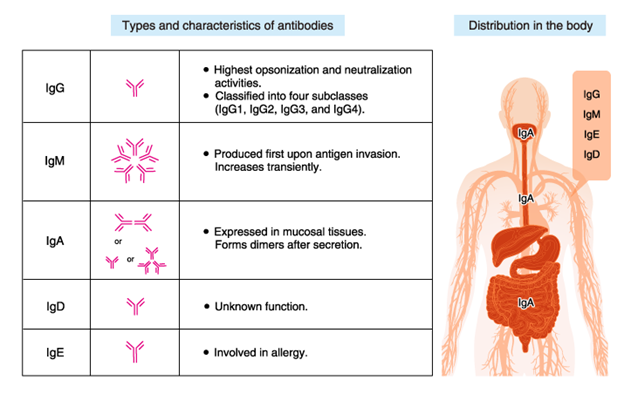The nurse is setting up an intravenous infusion pump to administer a dose of vancomycin [Vancocin] to a patient. What is the fastest rate at which the drug may be infused?
60 minutes
30 minutes
90 minutes
45 minutes
The Correct Answer is A
Vancomycin is often administered over at least 60 minutes to reduce the risk of infusion-related reactions, such as "Red Man Syndrome," which is characterized by flushing, rash, and itching. This reaction is caused by the rapid infusion of vancomycin, leading to the release of histamine.
Nursing Test Bank
Naxlex Comprehensive Predictor Exams
Related Questions
Correct Answer is A
Explanation
A. IgE (Immunoglobulin E): This class of antibodies is primarily involved in hypersensitivity reactions Type I, which are immediate allergic reactions. When a person is exposed to an allergen they are sensitive to, IgE antibodies on the surface of mast cells and basophils bind to the allergen. This triggers the release of inflammatory mediators like histamine, leading to allergic symptoms such as itching, hives, and in severe cases, anaphylaxis.
B. IgA (Immunoglobulin A): IgA antibodies are primarily found in mucosal areas such as the respiratory and gastrointestinal tracts. They play a role in immune defense on mucosal surfaces and are important for preventing infections. While IgA is not directly associated with hypersensitivity reactions Type I, deficiencies in IgA can sometimes lead to increased susceptibility to certain infections.
C. IgG (Immunoglobulin G): IgG antibodies are the most common type of antibody in the bloodstream and are involved in various immune responses, including defense against bacterial and viral infections. IgG antibodies are not specific to Type I hypersensitivity reactions; they are part of the immune system's broader defense mechanisms.
D. IgM (Immunoglobulin M): IgM antibodies are the first antibodies to be produced in response to an infection. They are large pentameric molecules and are effective at agglutinating pathogens. IgM antibodies are involved in the primary immune response to infections, but they are not specifically associated with Type I hypersensitivity reactions.

Correct Answer is A
Explanation
A. Most type-1 reactions are allergic: This statement is accurate. Type-1 hypersensitivity reactions are typically associated with allergies. When a person is exposed to a specific allergen (like pollen or certain foods), their immune system overreacts, leading to various symptoms, from mild to severe.
B. It is mediated by IgA: This statement is incorrect. Type-1 hypersensitivity reactions are primarily mediated by immunoglobulin E (IgE) antibodies. When these antibodies bind to allergens, they trigger the release of histamine and other chemicals, causing allergic symptoms.
C. It never contributes to autoimmune diseases: This statement is incorrect. While type-1 hypersensitivity reactions are often associated with allergies, they are distinct from autoimmune diseases. In autoimmune diseases, the immune system mistakenly attacks the body's own cells and tissues, which is a different mechanism from hypersensitivity reactions.
D. Most occur against medications: This statement is not entirely accurate. While some type-1 hypersensitivity reactions can be triggered by medications (like penicillin), they can also be caused by various other allergens such as pollen, animal dander, insect venom, and certain foods. The prevalence of medication-induced type-1 reactions varies, and it's not accurate to say that most occur against medications.
Whether you are a student looking to ace your exams or a practicing nurse seeking to enhance your expertise , our nursing education contents will empower you with the confidence and competence to make a difference in the lives of patients and become a respected leader in the healthcare field.
Visit Naxlex, invest in your future and unlock endless possibilities with our unparalleled nursing education contents today
Report Wrong Answer on the Current Question
Do you disagree with the answer? If yes, what is your expected answer? Explain.
Kindly be descriptive with the issue you are facing.
